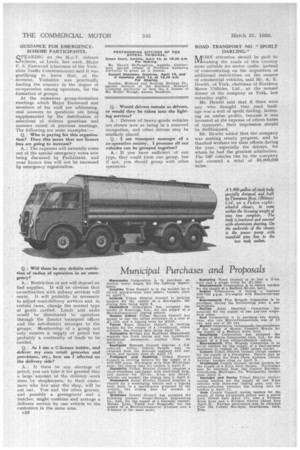GUIDANCE FOR EMERGENCY. SCHEME PARTICIPANTS.
Page 72

If you've noticed an error in this article please click here to report it so we can fix it.
SPEAKING on the M.o.T. defence scheme, at Leeds, last week, Major F. S. Eastwood (chairman of the Yorkshire Traffic Commissioners) said it was gratifying to know that, at the moment, Yorkshire was practically leading the country in the degree of co-operation among operators, for the formation of groups.
At the numerous group-formation meetings which Major Eastwood and members of his staff are addressing, oral answers to questions are being supplemented by the distribution of selections of written questions and answers raised at previous meetings. The following are some examples:— Q. : Who is paying for this organization? Does this mean that our licence fees are going to increase?
A.: The expenses will naturally come out of the special emergency votes now being discussed by Parliament, and your licence fees will not be increased by emergency organization.
Q.: Will there be any definite restriction of radius of operation in an emergency?
A.: Restriction or not will depend on fuel supplies. It will be obvious that co-ordination with railway services will occur. It will probably be necessary to adjust road-delivery services and, in certain cases, change the normal type of goods carried. Loads and tasks would be distributed to operators through the district transport officer and the sub-district manager to the groups. Membership of a group not only ensures a supply of petrol but probably a continuity of loads to be carried.
Q.: As I am a C-licence holder, and deliver my own retail groceries and provisions, etc., how am I affected on the delivery side?
A.: If there be any shortage of petrol, you can take it for granted that a large 'amount of the delivery work done by shopkeepers, to their customers who live near the shop, will be cut out. You and the other grocers, and possibly a greengrocer and a butcher, might combine and arrange a delivery service by one vehicle to the customers in the same area.
c18 , Q.: Would drivers remain as drivers, or would they be taken into the fighting services?
A.: Drivers of heavy-goods vehicles are shown now as being in a reserved occupation, and other drivers may be similarly placed, Q.: I am transport manager of a co-operative society. I presume all our vehicles can be grouped together?
A.: If you have sufficient of one type, they could form one group, but if not, you should group with other operators.
























































































































































